Project
Resolute
AI-assisted calorie budgeting
No complicated weight loss strategy, just budget and burn
Losing weight ultimately comes down to one thing: consuming less calories than you burn. Most apps overcomplicate tracking calories, but Resolute is simple: set your calorie budget, and tell it when you eat and exercise.
Let's face it: losing weight is hard. Resolute takes care of the boring bits so that you can focus on creating new, healthy habits.
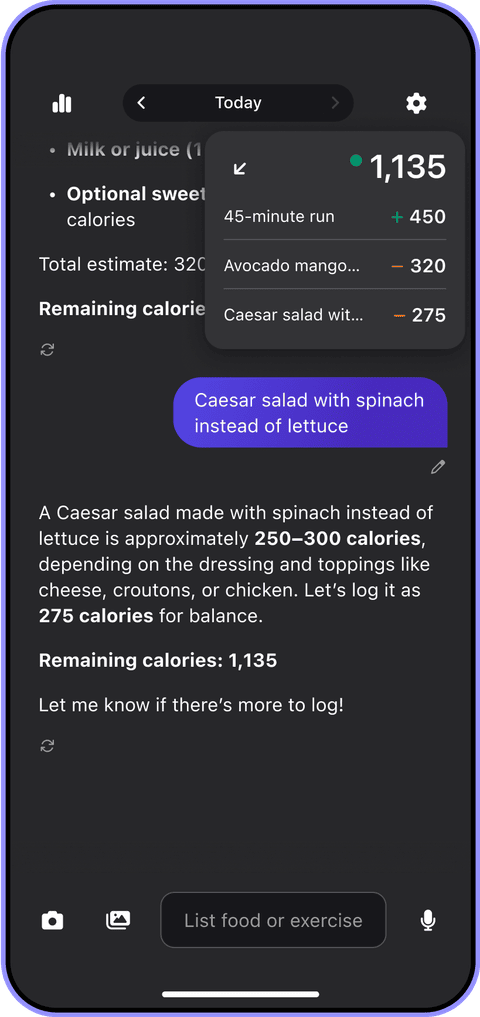

Spark
When I decided to count calories I weighed my options as to how I would track my count.
I'd tried spreadsheets in the past and they were too painful in a mobile context. I tried Airtable as well, but the functionality wasn't quite there.
I moved on to the App Store. But most apps from the app store were big misses for the following reasons:
- Overpriced subscriptions that try to force you into a yearly payment. My goal for this app was to be healthy in a few months, not years!
- Not knowing what you’re getting into up front. It’s unclear before downloading an app what it’s feature set will be.
- Even if an app had a demo period, that demo period was too short and forced you to give an email address leading to unwelcome marketing.
I waded through the mess and found two options.
MacroFactor
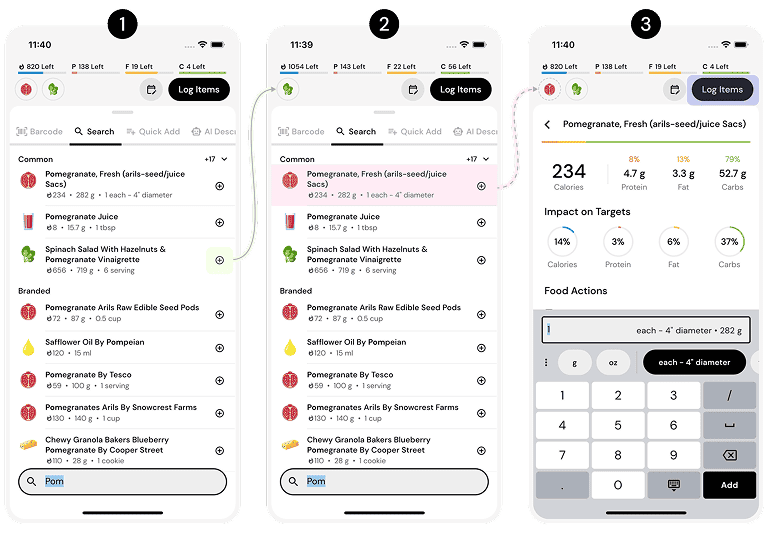
Pros:
- MacroFactor was full of complex features.
- A deep library of foods
- The ability to scan a label to quickly grab nutrition information.
- Tracking protein, fats and carbs in addition to calories.
Cons:
- Quickly adding a basic meal and/or modifying the number of servings was quite confusing, and could not be done in one step.
- Expensive service that tries to lock you in to a yearly subscription.
- Extensive marketing campaigns, which made me regret giving them my information.
Despite the difficulties I used the app doggedly for the 15 day trial, but in that time I never mastered the task of quickly adding a meal. Ultimately MacroFactor felt too complex and bloated for my needs
EasyCalorie
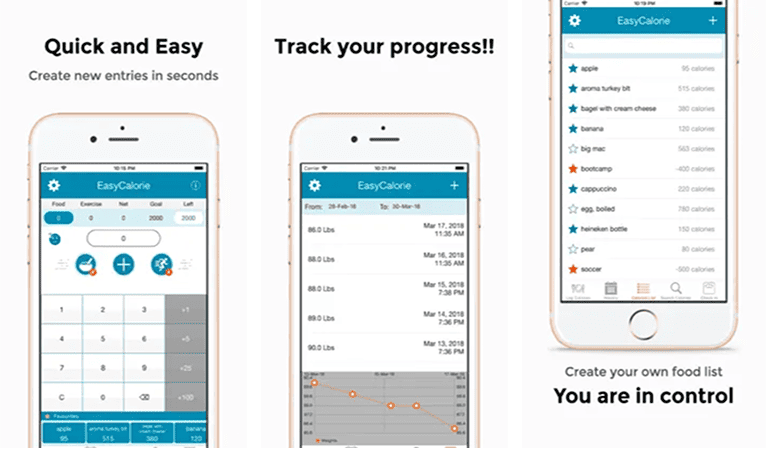
EasyCalorie was the polar opposite of MacroFactor.
Pros:
- Simple; type in your calories, hit a button and you're done.
- Tracked calories for both food and exercise.
- The ability to save a meal for future use
Cons:
- The app had not kept up with iPhone updates and visuals were janky and many features were broken.
- No Functionality to look up meals, which led me to spending a lot of time on google to assess calories.
EasyCalorie was ugly, but it enabled me to do exactly what I wanted to do while feeling good about not being tied into a subscription.
Discovery
A strong point of view
Despite the fact that EasyCalorie was lacking in features— not to mention that it was not maintained and breaking— it still had the simple approach I was looking for.
I set out to make it better.
I identified opportunitites I wanted to explore.
- Persistent calorie target in the top right
- Focusing the core experience around the “calorie ledger”, as opposed to the input calculator
- Color coding exercise (burn) vs food (intake)
- Visual UI and branding
- Visual UI and branding
- A fixed price point for a one-time purchase.
I felt like I was starting to get momentum in the right direction.
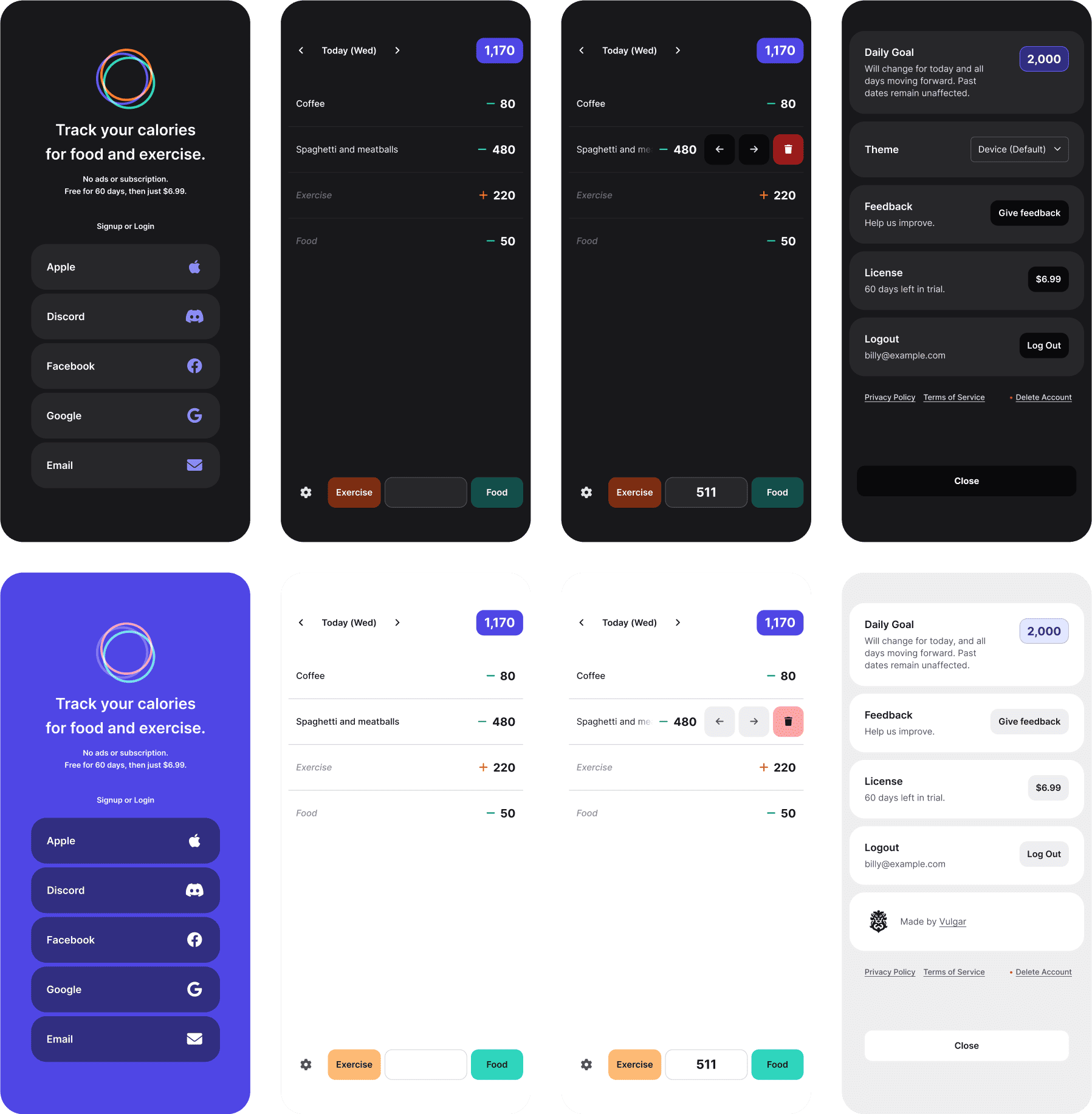
A big pivot
It was at this point that I started to tackle the problem of bringing Resolute to the “working software” state.
I wanted to keep up momentum, and I decided that I preferred something usable over more rounds of research.
So I asked myself, “What is a true MVP here?”
ChatGPT had only been out for a few months at the time, and somewhere along the way I had this idea to try it for this task. I created at ChatGPT applet which I named “Resolute Alpha.”
It changed everything.
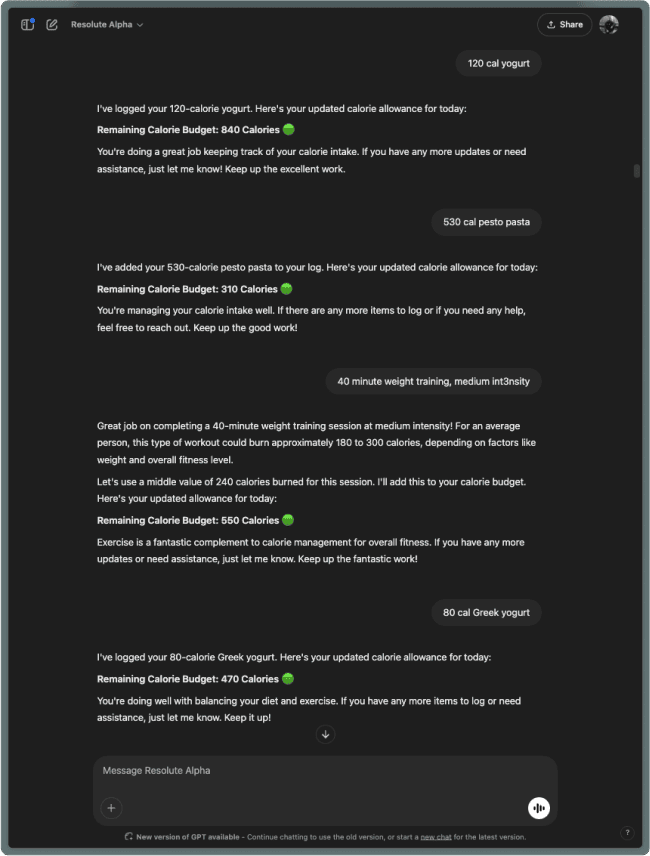
Not only did ChatGPT record calories, it would look up nutrition information and offer words of encouragement. It truly felt like a game changer.
Design
Resolute Alpha made me rething my approach completely.
That said, there was now a whole different set of opportunitites to dig into.
Pros
- Easy experience—type in what I ate or the exercise I completed and it did the rest.
- It created context for me to make adjustments, so it might put me in the “average,” but give me the context to make adjustments if necessary.
- It added a green dot to my calorie status so I could quickly find it.
- It offered words of encouragement.
Opportunities
- I still found myself wanting a persistent number that showed my latest calories.
- I wanted my calorie ledger to be on the main screen.
- I wanted the ability to statistically track my progress.
- The GenAI gave verbose responses. I tried asking it not to be verbose but it didn’t seem to understand, so I wanted this ability in settings.
- If I asked it to list my daily calories or summarize my calories for the week it would get confused.
- Sometimes calorie estimates were way off. This was usually easy to recognize, but was an error I never had when I was manually looking things up myself while using EasyCalorie.
With these learnings in mind I pivoted my design approach to be based around GenAI, but with the refined improvements for a calorie counting context.
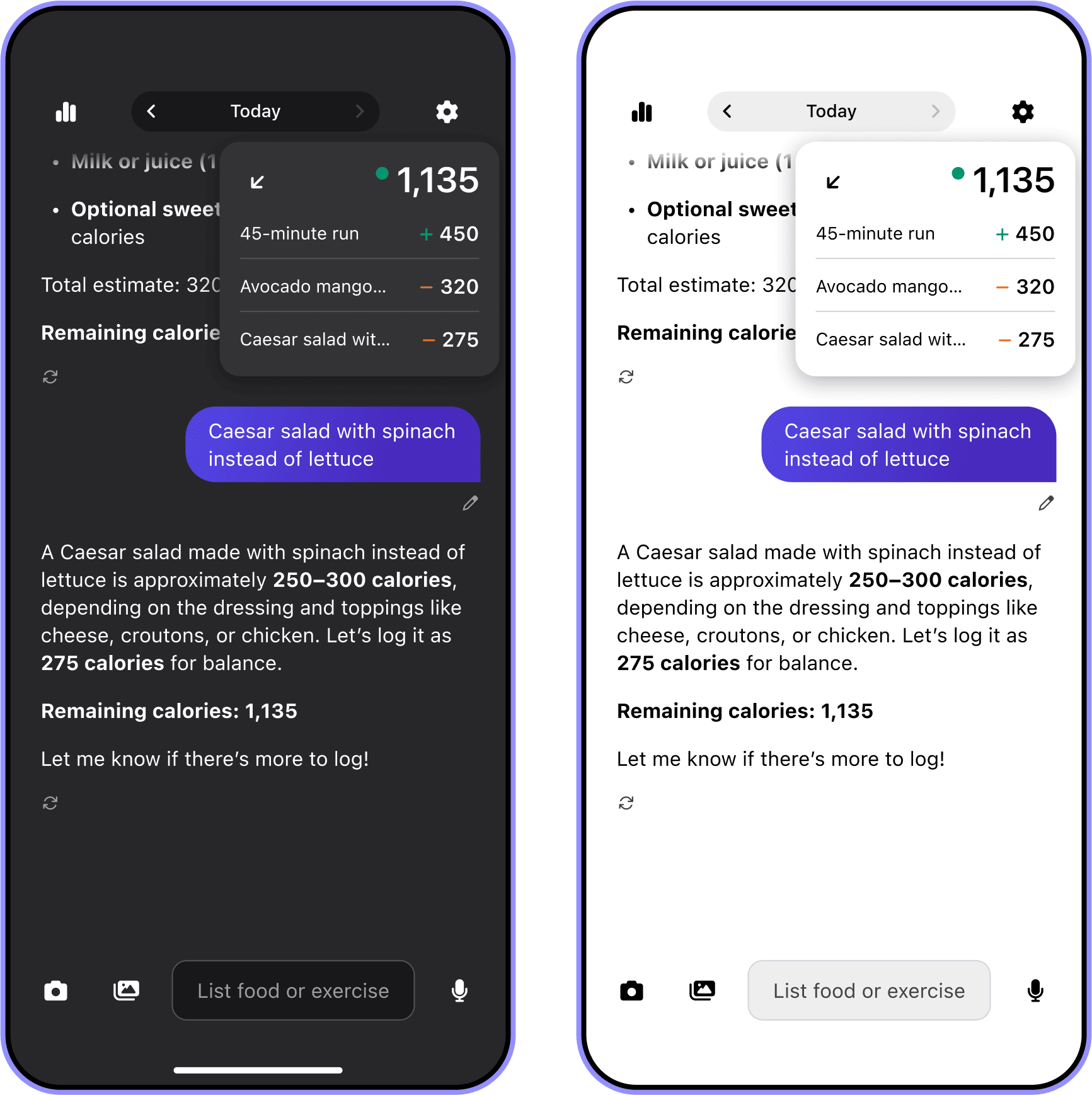
Resolute now asserted the best of both my original idea and the new GenAi exploration: easily track food and exercise around a central calorie ledger, with easy food lookups and exercise calculations, and future options for label scanning and barcode lookups.
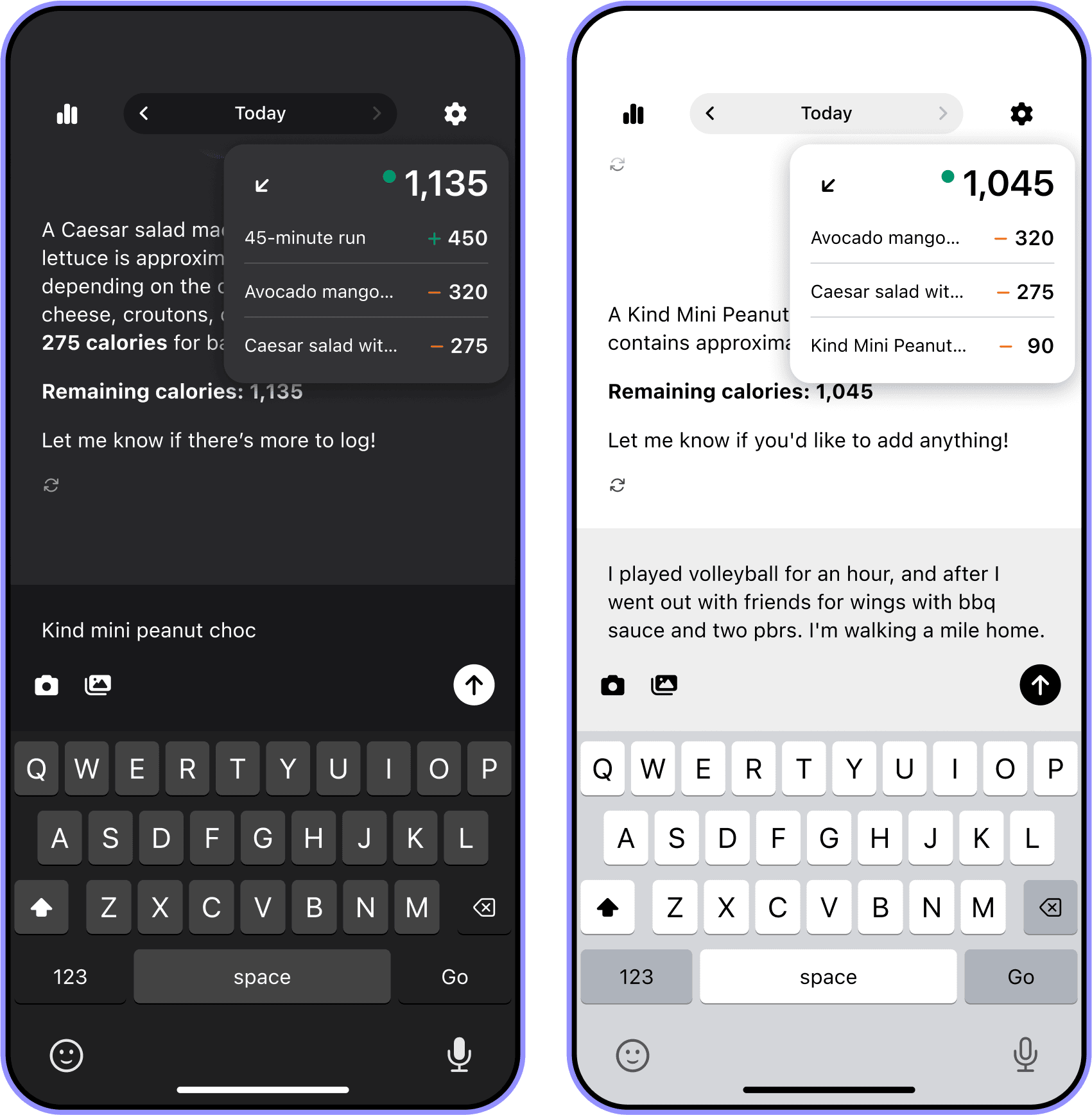
Clickable prototype with Figma
After designing a core design experience, I knew I would have trouble articulating the advantages of this design until someone saw it in action.
I took my designs one step forward to create a clickable prototype in Figma.
Build
I am currently exploring ways to bring Resolute build an MVP product to the app store.